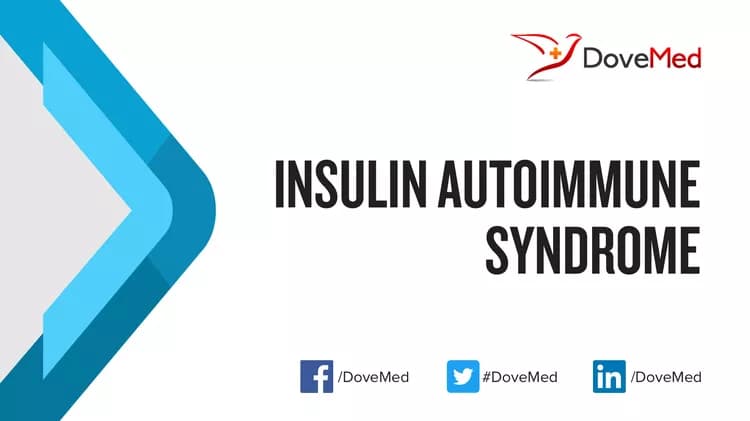What are the other Names for this Condition? (Also known as/Synonyms)
- Hirata Disease
- Insulin Autoimmune Hypoglycemia
What is Insulin Autoimmune Syndrome? (Definition/Background Information)
- Insulin Autoimmune Syndrome is a rare condition that causes low blood sugar (hypoglycemia). This occurs because the body begins to make a specific kind of protein called antibodies to attack insulin
- Insulin is a naturally occurring hormone that is responsible for keeping blood sugar at a normal level. When blood sugar levels get too high, insulin helps to store the sugar for future use
- People affected by Insulin Autoimmune Syndrome have antibodies that attack insulin, causing it to work too hard and the level of blood sugar to become too low
- Insulin Autoimmune Syndrome most often begins during adulthood
(Source: Insulin Autoimmune Syndrome; Genetic and Rare Disease Information Center (GARD) of National Center for Advancing Translational Science (NCATS), USA.)
Who gets Insulin Autoimmune Syndrome? (Age and Sex Distribution)
- Insulin Autoimmune Syndrome is a rare disorder. The presentation of symptoms typically occur in adulthood, although the condition may occur in younger individuals as well
- Both males and females may be affected
- Worldwide, individuals of all racial and ethnic groups may be affected
What are the Risk Factors for Insulin Autoimmune Syndrome? (Predisposing Factors)
The risk factors for Insulin Autoimmune Syndrome may include:
- A pre-existing autoimmune condition
- Use of certain medications containing sulphydryl compounds
- Use of medications containing alpha-lipoic acid
It is important to note that having a risk factor does not mean that one will get the condition. A risk factor increases one’s chances of getting a condition compared to an individual without the risk factors. Some risk factors are more important than others.
Also, not having a risk factor does not mean that an individual will not get the condition. It is always important to discuss the effect of risk factors with your healthcare provider.
What are the Causes of Insulin Autoimmune Syndrome? (Etiology)
- Insulin Autoimmune Syndrome is caused by production of auto-antibodies against insulin
- The condition is considered an autoimmune disorder, in which antibodies begin attacking one’s own body instead of pathogens and foreign bodies
- The exact reason for the autoimmnune response against insulin molecules is unlcear. However, the following factors are reported to contribute to the development of Insulin Autoimmune Syndrome:
- Pre-existing autoimmune disorder, indicating a malfunctioning immune system
- Medications used to treat such disorders, which may contain sulphydryl compounds
- Certain drugs used in weight loss programs (such as alpha-lipoic acid)
What are the Signs and Symptoms of Insulin Autoimmune Syndrome?
The signs and symptoms of Insulin Autoimmune Syndrome may vary among affected individuals in type and severity.
- Sweating
- Lightheadedness
- Fainting
- Weakness and fatigue
How is Insulin Autoimmune Syndrome Diagnosed?
Insulin Autoimmune Syndrome is diagnosed on the basis of the following information:
- Complete physical examination
- Thorough medical history evaluation
- Assessment of signs and symptoms
- Laboratory tests, which include measurement of blood sugar levels
- Imaging studies
- Biopsy studies, if necessary
- Differential diagnosis to rule out conditions that may produce similar symptoms
Many clinical conditions may have similar signs and symptoms. Your healthcare provider may perform additional tests to rule out other clinical conditions to arrive at a definitive diagnosis.
What are the possible Complications of Insulin Autoimmune Syndrome?
The complications of Insulin Autoimmune Syndrome may include:
- Coma due to severe hypoglycemia
- Damage to pancreas, with prolonged destruction of insulin molecules by autoantibodies
Complications may occur with or without treatment, and in some cases, due to treatment also.
How is Insulin Autoimmune Syndrome Treated?
The treatment of Insulin Autoimmune Syndrome may include:
- Eating smaller meals more frequently in order to maintain a more consistent blood sugar level
- Continuous monitoring of blood sugar
- Steroids
- Plasmaphoresis, which removes the blood from the body, separates the insulin antibodies in the blood stream, and replaces the blood without the antibodies
- Any damage to the pancreas may also require treatment
(Source: Insulin Autoimmune Syndrome; Genetic and Rare Disease Information Center (GARD) of National Center for Advancing Translational Science (NCATS), USA.)
How can Insulin Autoimmune Syndrome be Prevented?
At the present time, Insulin Autoimmune Syndrome which may be caused by a pre-existing autoimmune disorder may not be preventable
- If the condition correlates with the use of dieting medications or drugs, then discontinuing the said medication may help minimize the episodes, and prevent damage to pancreas
- Active research is currently being performed to explore the possibilities for treatment and prevention of s disorders such as Insulin Autoimmune Syndrome
Regular medical screening at periodic intervals with tests and physical examinations are recommended.
What is the Prognosis of Insulin Autoimmune Syndrome? (Outcomes/Resolutions)
- The prognosis of Insulin Autoimmune Syndrome is considered to be good, since in most affected individuals, the symptoms are known to resolve in a few months
- Some of those affected may continue to experience recurrent episodes of low blood sugar, which may require treatment
- Prolonged and recurrent episodes of low blood sugar due to Insulin Autoimmune Syndrome can lead to pancreatic damage
Additional and Relevant Useful Information for Insulin Autoimmune Syndrome:
The following DoveMed website link is a useful resource for additional information:
Related Articles
Test Your Knowledge
Asked by users
Related Centers
Related Specialties
Related Physicians
Related Procedures
Related Resources
Join DoveHubs
and connect with fellow professionals


0 Comments
Please log in to post a comment.